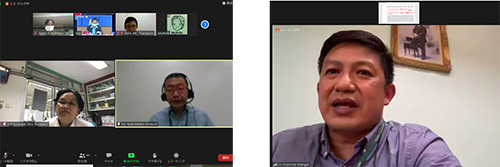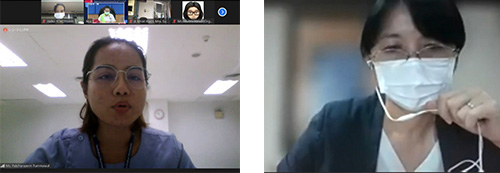- Home
- Technical Cooperation Projects
- Index of Countries
- Asia
- Thailand
- Project on seamless health and social services provision for elderly persons (S-TOP)
- Project News
- Second Online Training: Policy on Long-term Care and Living-Support for Older Adults
Project News
2021-08-26
Second Online Training: Policy on Long-term Care and Living-Support for Older Adults
The second online Training on "Policy on Long-term Care and Living-Support for Older Adults" was held from 24 to 26 August 2021. Opening remarks were made by representatives of Ministry of Public Health (MOPH), Ministry of Social Development and Human Security (MSDHS), National Health Security Office (NSHO) and JICA S-TOP. Twenty-four participants and more than forty observers from implementing organizations of S-TOP attended a three-day training.

1st Day: 24 August 2021
In the morning, Mr. Shintaro Nakamura from JICA Headquarters gave a lecture on policy and practice on long-term care and living support for older adults in Japan. During his lecture, he introduced two case studies on practicing integrated care in Japan from Higashiomi and Komagane cities. Self-care of stroke patients under a hospital/municipality partnership had been implemented in Komagane City. Higashiomi City had an excellent local study group composed of medical professionals, and a community-based critical pathway for stroke patients. Participants raised many questions such as how to continue monitoring of stroke patients according to the self-management plan in Komagane City, or how public and private sectors can work together to provide adequate health care services for older persons in Japan.
In the afternoon, Dr. Prasitchai Mangjit, Director of Public Health Regional Office 4, made a presentation on Saraburi model for seamless care for older adults. After the presentation, participants from the training program could discuss how they can conduct seamless care with smooth transition from intermediate care (IMC) to long-term care (LTC) and share ideas on how they can ensure sustainable provision of LTC with the support from communities in each province.

2nd Day: 25 August 2021
In the morning, Dr.Hitomi Kurosu of National Institute of Infectious Diseases in Japan, shared recent challenges in the control of COVID-19 at health facilities for older persons in Japan. During the discussion participants exchanged their own ideas and experiences on how health facilities at the community level in Thailand can provide continuous support for older persons by taking necessary measures for preventing the spread of COVID-19.
In the afternoon, Dr. Yoshiko Tsukada of Saku University explained about another JICA elderly care project in Tambon Saensuk in Chonburi. Dr. Tsukada shared results from research on roles and responsibilities of health volunteers in the long-term care of older persons in Chonburi. Following this participants held discussions on what they could learn from good practices from this project in Chonburi Province and how they could utilize this learning to enhance capacities and motivations of health volunteers in their own provinces.

3rd Day: 26 August 2021
In the morning on the 3rd day of online training, there were two presentations regarding the operation and management of day care center in Japan and Thailand. Ms. Keiko Mehra, Expert of JICA S-TOP, explained about day care centers in Japan with the video clip "A Day at the Day Care Center in Japan: Kikyo no Sato (in Fuji City, Shizuoka)". Ms. Patcharaporn Thummawut from Life Quality of the Elderly Development Center, Nonthaburi Municipality, explained how they manage human and financial resources to maintain the day care center. Participants from Department of Health (DOH) of MOPH and MSDHS provided additional information such as guidelines for support activities for older persons under COVID-19, government fund for promoting healthy ageing and training curriculum of volunteers for older persons.

In the afternoon, Dr. Junji Haruta from Keio University of Japan gave a lecture titled "Why do we need Interprofessional Working (IPW)? What kind of IPW is needed?". He introduced the conceptual framework of IPW as well as the actual practice of IPW in the long-term care of older persons in Japan. During the discussion session with Dr. Haruta, participants exchanged their opinions about the success factors, difficulties, and challenges of IPW in Thailand. A registered nurse from an acute hospital in Bangkok explained that there are two success factors for IPW in her working place. One is goal settings and the other is equality among different health professionals. A physical therapist from Chonburi emphasized the importance of time management, communication and flexibility among the different medical professionals in order to conduct home visits for older persons by multidisciplinary medical team.
The second Online Training concluded with the closing remarks by Dr. Kornkrit Limsommut, Director of Health Administration Division, Ministry of Public Health.

- About JICA
- News & Features
- Countries & Regions
- Our Work
- Thematic Issues
- Types of Assistance
- Partnerships with Other Development Partners
- Climate Change / Environmental and Social Considerations
- Evaluations
- Compliance and Anti-corruption
- Science and Technology Cooperation on Global Issues
- Research
- JICA Development Studies Program / JICA Chair
- Support for the Acceptance of Foreign HRs / Multicultural and Inclusive Community
- Publications
- Investor Relations
